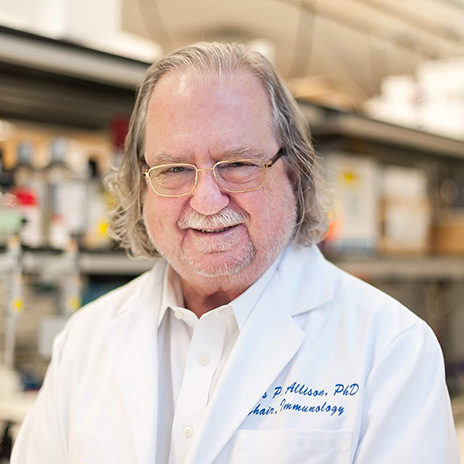
James P. Allison, PhD
“It’s a great, emotional privilege to meet cancer patients who’ve been successfully treated with immune checkpoint blockade. They are living proof of the power of basic science, of following our urge to learn and to understand how things work.”
James P. Allison is Regental Professor and Chair of the Department of Immunology, the Olga Keith Wiess Distinguished University Chair for Cancer Research, and the Executive Director of the Immunology Platform at MD Anderson Cancer Center. He studies the regulation of T-cell responses and develops strategies for cancer immunotherapy. He seeks to identify new therapeutic targets and improve immune checkpoint blockade therapies currently used by clinicians.
In 2018, Allison was awarded the Nobel Prize in Physiology or Medicine for his pioneering discovery of immune checkpoint therapy, a revolutionary treatment for cancer by inhibition of negative immune regulation. His work also led to the development of ipilimumab, an antibody to human CTLA-4 and the first immune checkpoint blockade therapy (Yervoy) approved by the FDA to treat metastatic melanoma.
Allison is also the Director of the Parker Institute for Cancer Research and the Cancer Research Institute. Among his discoveries are the determination of the T cell receptor structure and that CD28 is the major costimulatory molecule that allows full activation of naïve T cells and prevents anergy in T cell clones. His lab resolved a major controversy by demonstrating that CTLA-4 inhibits T-cell activation by opposing CD28-mediated costimulation and that blockade of CTLA-4 could enhance T cell responses, leading to tumor rejection in animal models.
He is an elected member of the National Academies of Science and Medicine, and a former Howard Hughes Medical Institute Investigator and President of the American Association of Immunologists. Among his many awards are the Lasker-Debakey Clinical Medical Research Award, the Jessie Stevenson Kovalenko Medal, and the Breakthrough Prize in Life Sciences. He is the subject of the documentary “Jim Allison: Breakthrough” and was named one of TIME’s Most Influential People of 2017.
Allison earned his B.S. degree in microbiology and his Ph.D. in biological science from the University of Texas at Austin. He completed his postdoctoral work at Scripps Research before joining MD Anderson; the Universities of California, Berkeley and San Francisco, where he was concurrently appointed professor; and the Memorial Sloan-Kettering Cancer Center.






